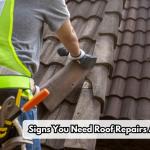
Signs You Need Roof Repairs ASAP
This guide will surely provide insight into simple signs of roofing problems that you may not know about. This could possibly lead to souring elements in the construction process, which can result in hefty bills for fixing these damages, potential water damage and in cases where the issue is too dangerous, it could even impact the safety of the premises. Hence, before the rain pours again, use the insights you've gathered to understand the importance of a solid and dependable roof and identify the need for reliable roof repairs.
Ignoring roof damage can cost you more
Regard your roof as the sentinel of your house. It hides you from rain, hail, and the hot sun. Nevertheless, if the safety is risked, the costs can be high. Water damage can bring a catastrophe to your ceilings, walls as well as wiring of electricity. In severe cases, there can be the emergence of structural issues, which may undermine the very nature of the entire house. Not to mention, a leaky roof during a downpour is a recipe for a major headache (and a potential safety hazard!).
5 warning signs you shouldn't ignore
Now, how do you know if your roof is sending out an SOS? Here are five red flags you shouldn't brush aside:
1. Visible Leaks or Moisture Stains:
While the initial statement about brown patches is relatable, let's delve deeper into the importance of identifying leaks and moisture stains.
Water's silent threat:
- Leaks are not just unsightly, they are perceptible factors of water ingression which consequently can be manifested into:
- Extensive structural damage: Bad conditions, damaged wood, warped floors, barely intact building materials.
- Mould growth: This leads to significant health risks and may even be costly to correct.
- Increased energy costs
Imagine your roof as a medieval castle, with shingles acting as the individual tiles forming its protective outer layer. Now, picture some of these tiles missing, broken, or warped at the edges. Just like a weakened castle wall, these compromised shingles leave the underlying structure vulnerable. Missing shingles expose the underlayment, the layer beneath the shingles, directly to the elements, while damaged ones lose their waterproofing capabilities. Both scenarios create a prime situation for leaks and further deterioration, making timely repairs crucial.
3. Sagging Roofline or Ceilings:
A sagging roofline or ceiling is a red flag that shouldn't be ignored. It signals potential structural issues within your home. These issues could stem from various causes, including:
- Water damage: Water can find a way to get into the interior structure of the roofing and thus reduce its strength and elasticity.
- Overloading: Regions with snowfall have more chances of excessive snow which eventually may weigh too much on the roofs, thus, posing a problem in the durability of roofs, causing sagging.
- Termite infestation: One of the most damaging insects can be literally small but destructive. As a result, it can weaken the wooden supporting beams of your roof, causing it to sag.
4. Cracked or Peeling Flashing:
While metal flashing on the roof is not normally the most noticeable part of the roof, it plays a critical role in keeping your roof and the rest of your building intact. Flashing or other similar materials are installed that cover the holes around roof vents, chimneys, skylights and other potential leaking areas. On the contrary, while this critically important component sheds or peels, it fails a crucial test of being watertight. These could result in leaks in these critical areas, which therefore raises the need to check the condition of the flashing all the time.
5. Excessive Granule Loss in Asphalt Shingles:
Although asphalt shingles containing small granules on their surface are used in many places, most of them are found in different parts of the world. Those pieces do not just contribute to the pavement's texture but also act as a shield so that the ambient ultraviolet rays do not cause damage to the asphalt. If you gather your gutter and find a lot of these granules, that could be a clue that your shingles could be on the brink of their service life and are more vulnerable to damage. Instead of old shingles repairing the wear and tear can prevent leaks and it can also contribute to the longer life of the roof.
Take Action: Have a roof inspection on your schedule
The refusal to heed these warning signs can, sometimes, be too tempting. However, it will eventually lead to a disaster (and a highly costly repair bill) in the future. It is recommended that visually examining the rooftop by a professional with the needed expertise at least once a year is the best way of detecting minor issues before they grow bigger and more serious. A dependable roof repairs Sydney company can testify to your roof’s conditions, identify root causes of problems, and suggest the proper course of action to be taken.
Know well that your roof is the first defence degree of your home. On top of that, always being prepared and listening to its warning signals, you would keep the shield safe for years. Don’t procrastinate for the clouds to get dark – start improving right now and keep your roof safe!



